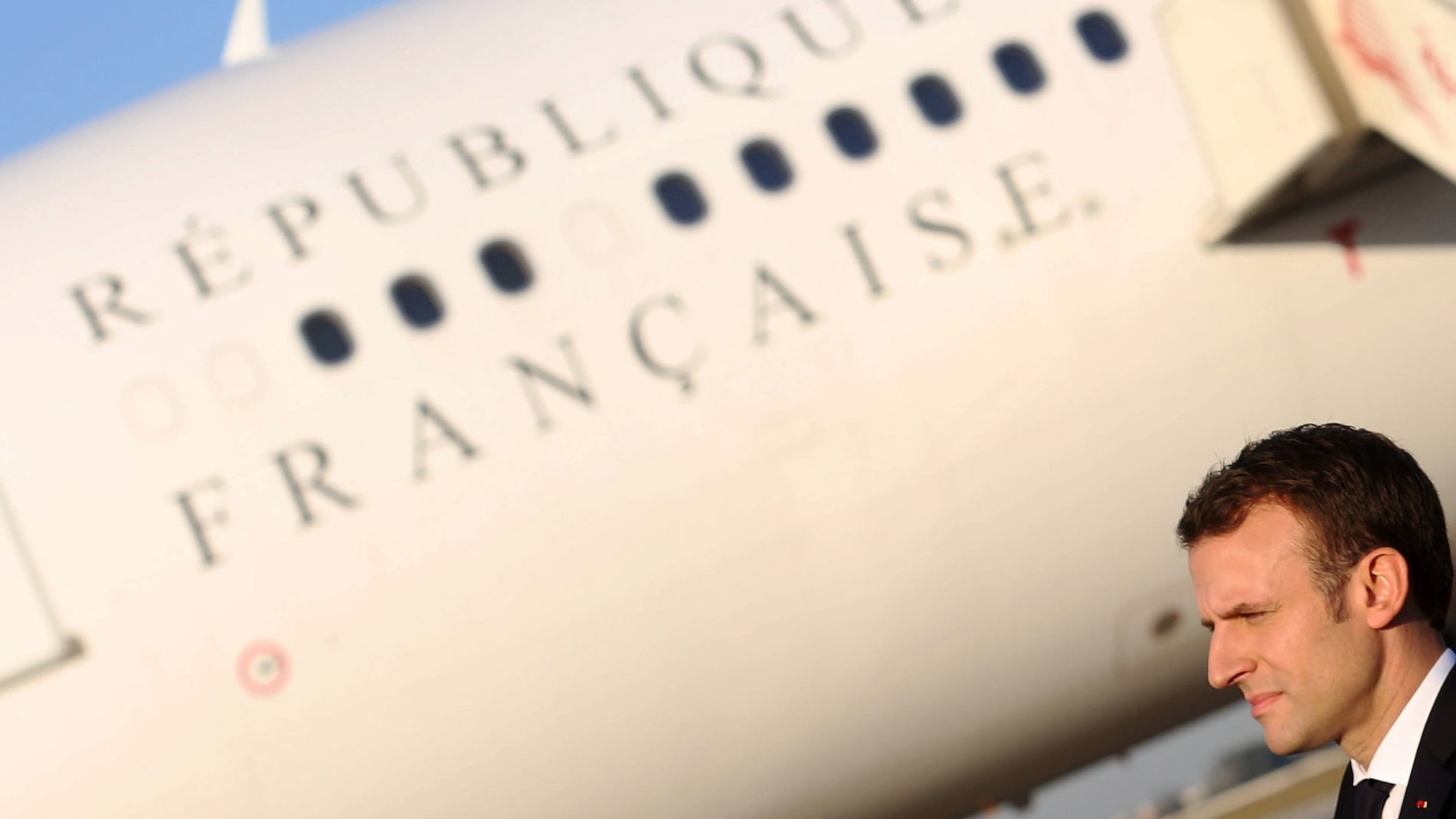French President Emmanuel Macron is attempting to reshape his country’s relations with Africa.
On a flurry of visits to the continent since taking office in May 2017 – Macron is
currently on a trip to Tunisia and Senegal – the French president has promised a fresh approach that casts off colonial legacies and builds trust based on equal partnerships and opportunities.
Can Macron succeed where his predecessors faltered?
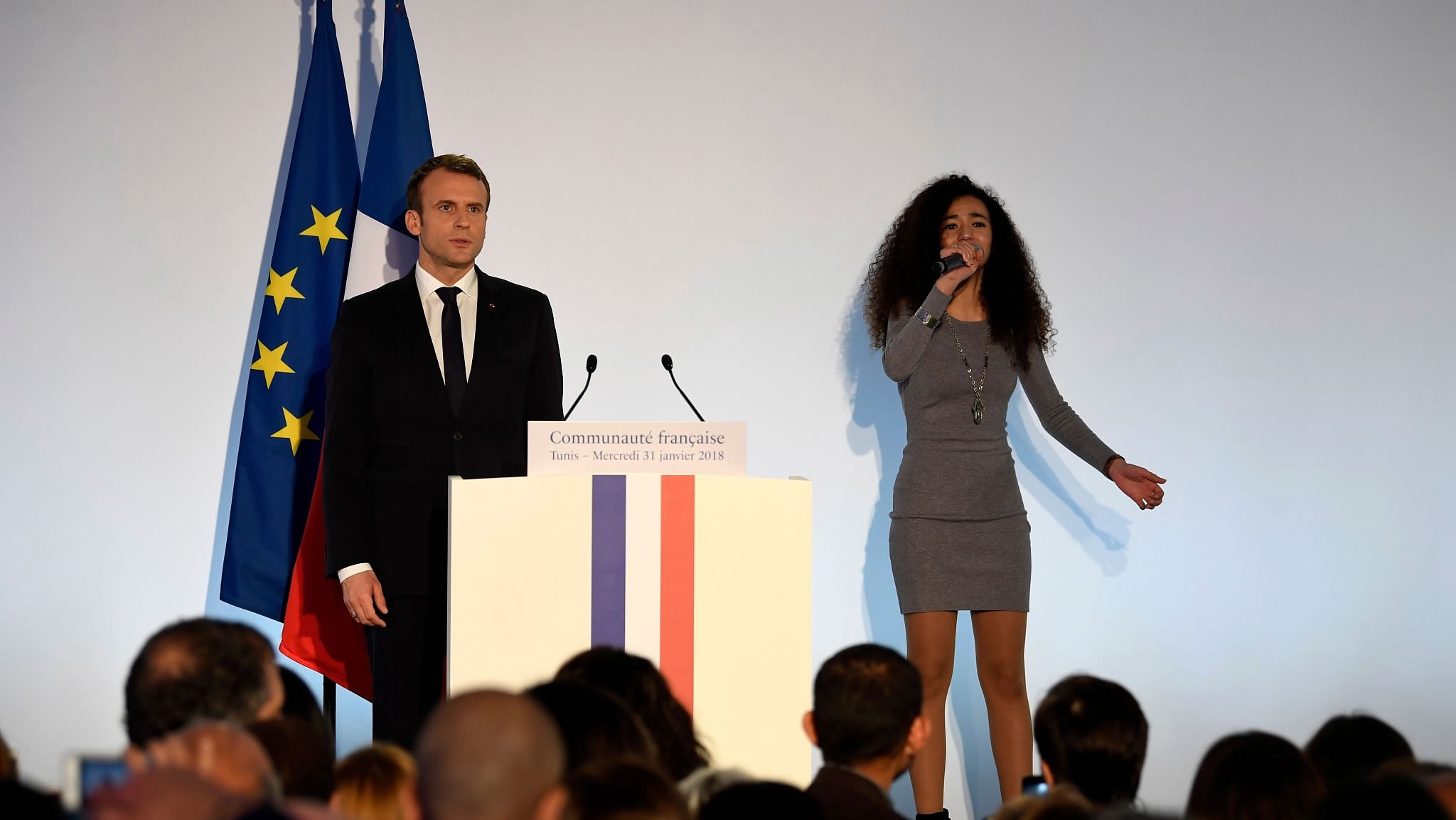
French President Emmanuel Macron (L) listens as a Tunisian singer (R) sings the French national anthem in the capital Tunis on January 31, 2018, during his first state visit to the country. /VCG Photo
French President Emmanuel Macron (L) listens as a Tunisian singer (R) sings the French national anthem in the capital Tunis on January 31, 2018, during his first state visit to the country. /VCG Photo
Some of the words are familiar, echoing pledges made by recent presidents Nicolas Sarkozy and Francois Hollande.
“There have been many promises made about renewing our relationship with Africa. We are not the first ones to want to do this,” a government source told AFP in November. “That is why this exercise is difficult, and it may be received with a certain amount of skepticism by the public.”
Macron has offered something his predecessors could not, however. In a three-nation trip in November 2017, the 40-year-old, who was born after French colonies became independent, pointedly said he was "from a generation that would not tell Africans what to do.”
“We have a president who has never known the colonies and never had those close links to the region’s leaders,” one diplomat told Reuters. “He has more freedom to say what he thinks.”
A break from the past?
Nicolas Sarkozy pledged to modernize relations when he won power in 2006, but enraged citizens of Senegal shortly after taking office with a speech in Dakar.
“The tragedy of Africa is that the African has not fully entered into history," Sarkozy said. "They have never really launched themselves into the future.”
In 2010, African leaders gathered with Sarkozy for a meeting designed, in the then president’s words, "to turn the page of the debate on [French] colonization and post-colonization."
But despite the rhetoric, neither Sarkozy nor Hollande ended the “Francafrique” system of backroom deals between French and African elites. The incumbent president has pledged to end the network, which critics see as anti-democratic and anachronistic.
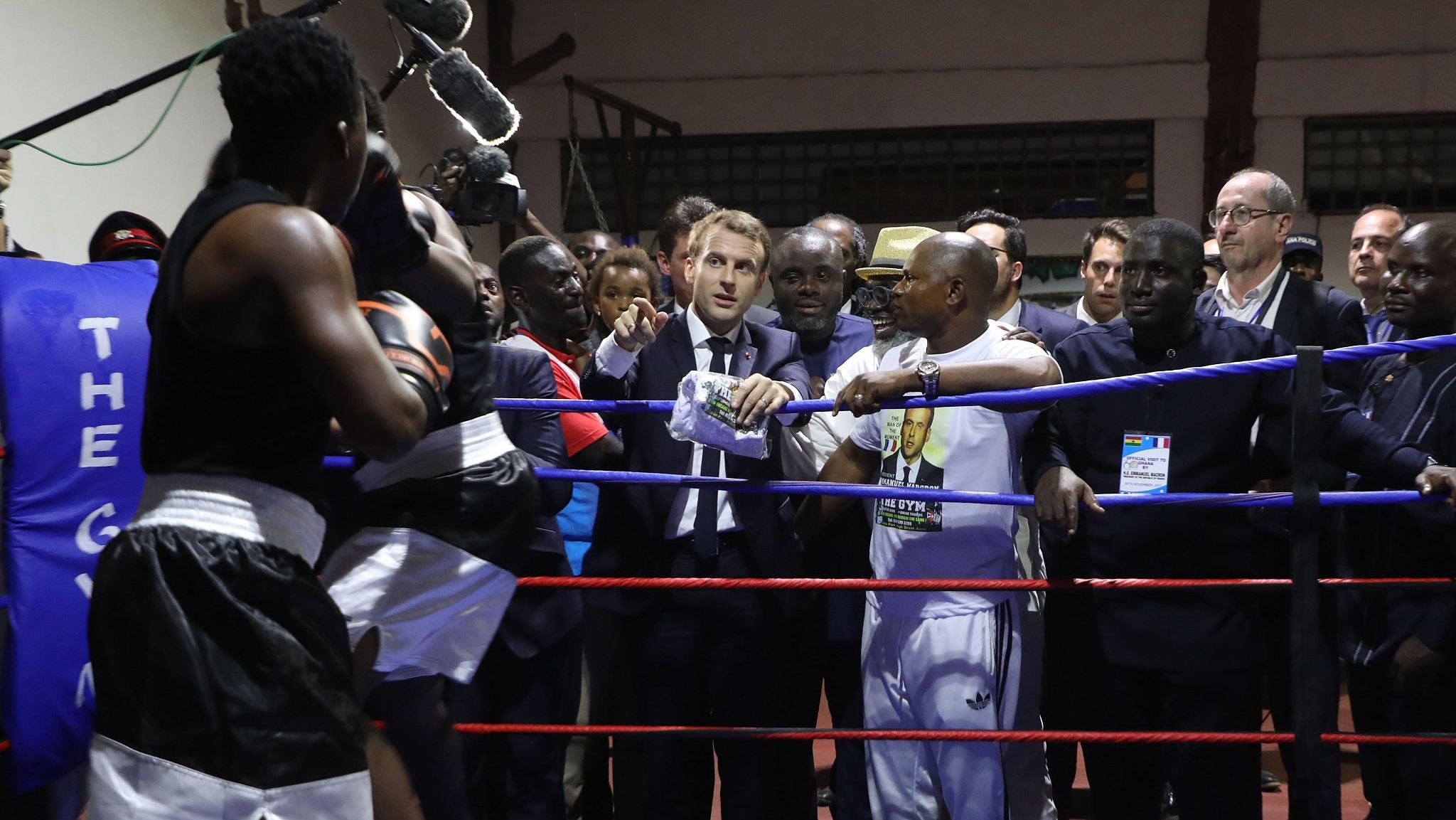
French President Emmanuel Macron (C-L) watches boxers spar during a visit to The Gym boxing club in the Jamestown quarter of Accra, Ghana on November 30, 2017. /VCG Photo
French President Emmanuel Macron (C-L) watches boxers spar during a visit to The Gym boxing club in the Jamestown quarter of Accra, Ghana on November 30, 2017. /VCG Photo
Macron, who spent six months working at France's embassy in Nigeria as a student, has attempted to start from a blank canvas and use symbolism to paint a vision of French-African relations. He was the first French president to visit the former British colony of Ghana.
As a candidate, he told newspaper Le Figaro that France’s colonization of Algeria involved “crimes and acts of barbarism” equivalent to “crimes against humanity.” He suggested that France should apologize for its colonial history.
In Tunisia on Wednesday, Macron stressed a message of equal partnership, saying "it's not aid that France is bringing Tunisia, it's a task that we need to undertake together. If you fail, we will fail the next day or the day after."
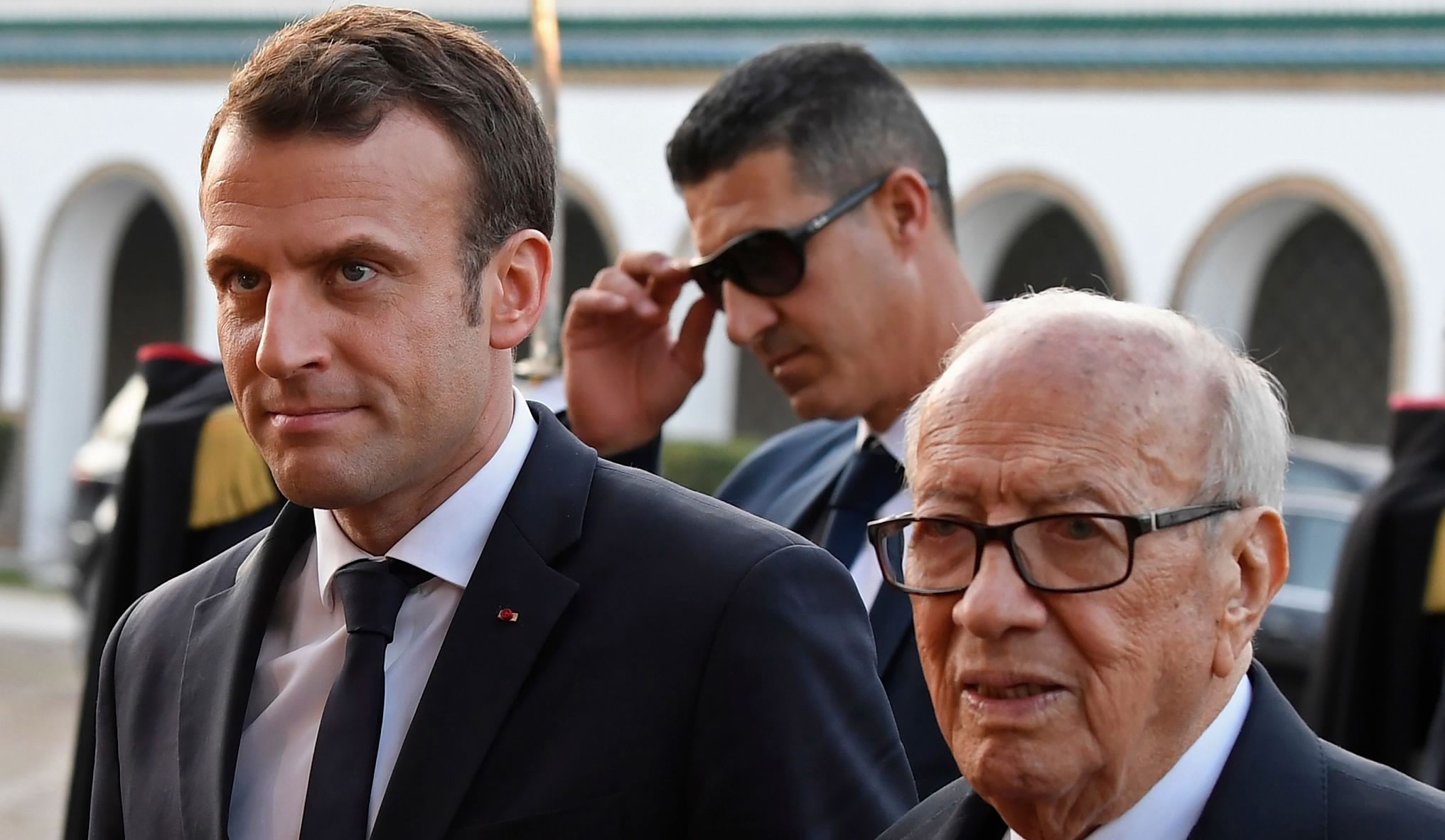
Tunisian President Beji Caid Essebsi (R) welcomes French President Emmanuel Macron following his arrival at the Presidential Palace in Carthage on January 31, 2018. /VCG Photo
Tunisian President Beji Caid Essebsi (R) welcomes French President Emmanuel Macron following his arrival at the Presidential Palace in Carthage on January 31, 2018. /VCG Photo
Macron has pledged to channel a greater percentage of France’s aid budget to Africa, and has promoted trade and business as routes to prosperity. He has set up a special council on Africa made up of young business people with ties to both France and Africa to advise him on how to bolster his country’s image on the continent.
Perhaps tellingly, Macron’s approach has also involved signals of cooperation with world powers. On his recent state visit to Beijing, Macron suggested that France and China could partner in Africa on climate issues.
Military and money
Macron’s new approach has been largely welcomed, but suspicions about French involvement remain.
In some areas, the president has shown little inclination to change policy. His first visit to Africa as president was to Mali, where around 4,000 French troops are based.
Fighting militant Islamist groups in the Sahel was central to Hollande’s African policy. Macron has strongly backed the G5 Sahel operation, a regional military force countering extremists, and called for more international support for it.
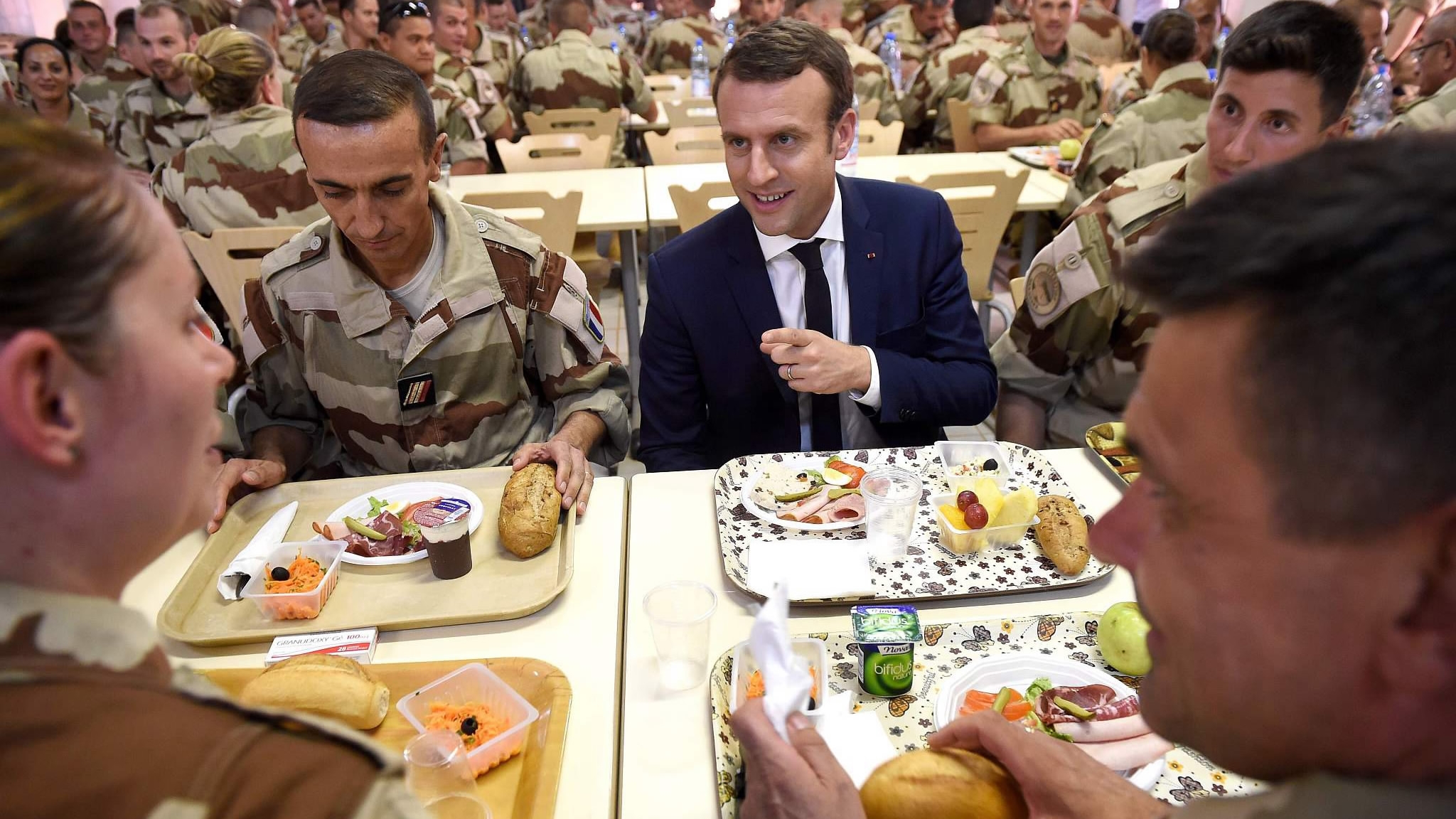
French President Emmanuel Macron (C) has a lunch break with French troops during his visit to France's Barkhane counter-terrorism operation in Africa's Sahel region in Gao, northern Mali, on May 19, 2017. /VCG Photo
French President Emmanuel Macron (C) has a lunch break with French troops during his visit to France's Barkhane counter-terrorism operation in Africa's Sahel region in Gao, northern Mali, on May 19, 2017. /VCG Photo
A persisting and controversial colonial legacy is the CFA Franc, created in 1945 as a currency for the French Union. Most French colonies declared independence in the early 1960s, but it remains the official currency for 14 African nations. It is pegged to the euro and is supported by the French treasury.
Some blame the currency for domestic economic problems and see it as a colonial overhang. Macron argues that it is up to the individual countries to decide whether to create their own currencies, and during his campaign suggested the CFA Franc could be phased out.
Macron has already made a serious play at reshaping his country’s image in Africa, and his repeated visits indicate that he is serious about resetting the relationship. Whether it is possible to untangle ties that have so much divisive history will be a true test of the president's diplomatic skills.

